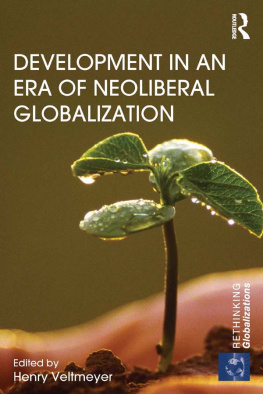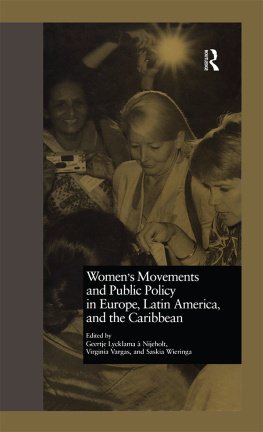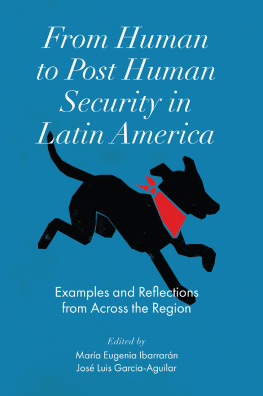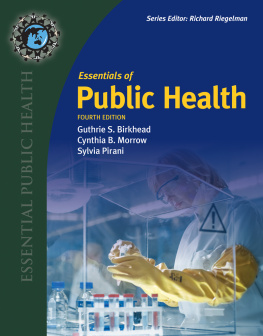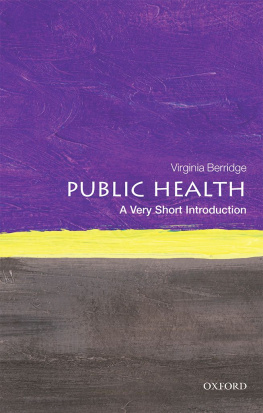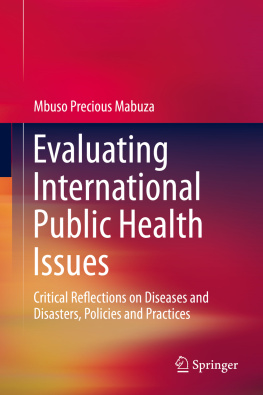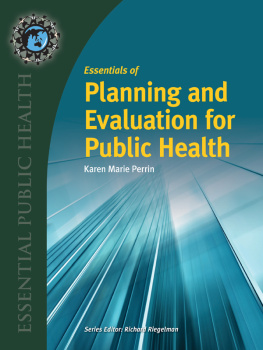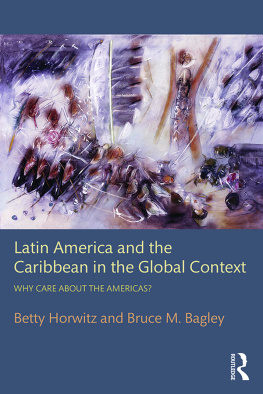Public Health and Beyond in Latin America and the Caribbean
Public Health and Beyond in Latin America and the Caribbean: Reflections from the Field explores the diverse and complex public health landscape, from global to regional to local, by considering historical and socio-cultural factors to contextualize the ongoing public health crisis.
Drawing on four decades of field experience, research, and teaching, Sherri L. Porcelain uses case studies to offer a realistic view of the public heath struggle in Latin America and the Caribbean. Using specific countries as regional examples, the book shows how population health has been inextricably linked to political, economic, social, cultural, ethical, ecological, environmental, and technological factors. Chapters in this book will examine the history of public health issues associated with international development, globalization and the international political economy, disasters, diplomacy, and security studies coupled with the changing role of key actors driving the global and regional agendas. The final chapter examines the impact of the COVID-19 pandemic and what it means for the future of public health.
This book is recommended for undergraduate students interested in the history of Latin America and the Caribbean as well as others concerned with global and regional population health challenges.
Sherri L. Porcelain is a Lecturer in the Department of International Studies at the University of Miami where she teaches global public health in world affairs with a focus on Latin America and the Caribbean for the Interdisciplinary International Studies Program. She has also been a voluntary faculty member in the Department of Public Health Sciences at the university since 1988.
Latin American Tpicos
Edited by Michael LaRosa, Rhodes College
Telenovelas in Pan-Latino Context
June Carolyn Erlick
The Youngest Citizens
Amy Risley
Latin American Soldiers
Armed Forces in the Regions History
John R. Bawden
Natural Disasters in Latin America and the Caribbean
Coping with Calamity
June Carolyn Erlick
Public Health and Beyond in Latin America and the Caribbean
Reflections from the Field
Sherri L. Porcelain
For more information about this series, please visit: www.routledge.com/Latin-American-Tpicos/book-series/LAT
First published 2022
by Routledge
605 Third Avenue, New York, NY 10158
and by Routledge
2 Park Square, Milton Park, Abingdon, Oxon, OX14 4RN
Routledge is an imprint of the Taylor & Francis Group, an informa business
2022 Taylor & Francis
The right of Sherri L. Porcelain to be identified as author of this work has been asserted by them in accordance with sections 77 and 78 of the Copyright, Designs and Patents Act 1988.
All rights reserved. No part of this book may be reprinted or reproduced or utilised in any form or by any electronic, mechanical, or other means, now known or hereafter invented, including photocopying and recording, or in any information storage or retrieval system, without permission in writing from the publishers.
Trademark notice: Product or corporate names may be trademarks or registered trademarks, and are used only for identification and explanation without intent to infringe.
Library of Congress Cataloging-in-Publication Data
Names: Porcelain, Sherri L., author.
Title: Public health and beyond in Latin America and the Caribbean : reflections from the field / Sherri L. Porcelain.
Description: First edition. | New York, NY : Routledge, 2022. |
Series: Latin american tpicos | Includes bibliographical references and index.
Identifiers: LCCN 2021014801 (print) | LCCN 2021014802 (ebook) | ISBN 9780367440756 (paperback) | ISBN 9780367440763 (hardback) | ISBN 9781003007401 (ebook)
Subjects: LCSH: Medical careLatin America. | Medical careCaribbean.
Classification: LCC RA450.5 .P68 2022 (print) | LCC RA450.5 (ebook) | DDC 362.1098dc23
LC record available at https://lccn.loc.gov/2021014801
LC ebook record available at https://lccn.loc.gov/2021014802
ISBN: 978-0-367-44076-3 (hbk)
ISBN: 978-0-367-44075-6 (pbk)
ISBN: 978-1-003-00740-1 (ebk)
DOI: 10.4324/9781003007401
Typeset in Bembo
by codeMantra
I dedicate this book to my mentor, David Taplin, who passed away in July 2018. Without his introduction to the art and science of field work in Latin America and the Caribbean, I would never have the opportunity to first experience the beauty and resiliency of the Comarca de Guna Yala, Panama in 1980, and for that I am indebted. I also dedicate this book to the Niadub/Ticantiki community my second home thank you for the lessons to become a better listener, more patient, and appreciative of the small accomplishments.
DOI: 10.4324/9781003007401-1
A review of some Latin America and the Caribbean regional public health challenges throughout history, for example, from the deadly diseases of yellow fever, malaria, and COVID-19 pandemic in the Americas, using each chapter to show the broader relationship of economic and social development, globalization and trade, disasters, diplomacy, and security to public health within and across countries in the region.
I realize some will criticize my analysis as very broad, label it tainted by selective experiences, and recognize that it does not fully assess the region. It would be presumptuous to assume I know all the issues, populations, strategies, and policies undertaken to improve population welfare in such a diversified region. What 42 years of experiences in a few countries in the region uncovered was the realization that the more I experienced, the more I learned, or read, the less I truthfully understood. I did learn that a wider approach to public health is built upon listening more to the voices of people. I invite the reader to justly question the trajectory of public health and its wider relationships to the history of Latin America and the Caribbean and international affairs as conceptualized in this book.
I emphasize two important points for the reader. First, I include my reflections from the field, recognizing that these are my personal experiences that might reveal a bias in selecting one case study, example, or anecdote over another. Such preferences may also be related to the specific topic, time in history, place, and the people and organizations in which I interacted that have influenced the way I interpret and present my experiences throughout the book. Second, I may not have included important Latin America and Caribbean scholars, scientists, and practitioners who have added significantly to the diverse subject areas. It is not my intent to minimize their noteworthy contributions. Suitably, my intent is to present an outsiders perspective considering the history, evidence, and competing viewpoints within and across Latin America and the Caribbean.
Latin America and the Caribbean
Latin America and the Caribbean is different within and across countries. South America with 14 countries, Central America with seven countries, and Mexico as part of the North American region. The Caribbean has 13 countries of which Cuba, Dominican Republic and Haiti (Hispaniola) speak Spanish and Creole, respectively. Not to forget Puerto Rico in the Caribbean which is a U.S. territory. Population density in 2019 spans from the smallest in the Caribbean ranging from 5,300 people in Montserrat to more than 11 million in Cuba, with Brazil as the most densely populated country in Latin America with 211.1 million followed by Mexico with 127.6 million. The main languages spoken in Latin America are Spanish, Portuguese, and more than 500 Indigenous languages, with English, Dutch, French, and Haitian Creole in the Caribbean. Many Indigenous languages remain important to this regions common history of European invasions and annexation of lands that began in the late 15th century and continued through the 18th century. Latin America and the Caribbean is characterized by the multicultural, multiracial, and multiethnic countries; yet regional approaches are useful in identifying some prevailing themes in the broader discussion of population well-being.


